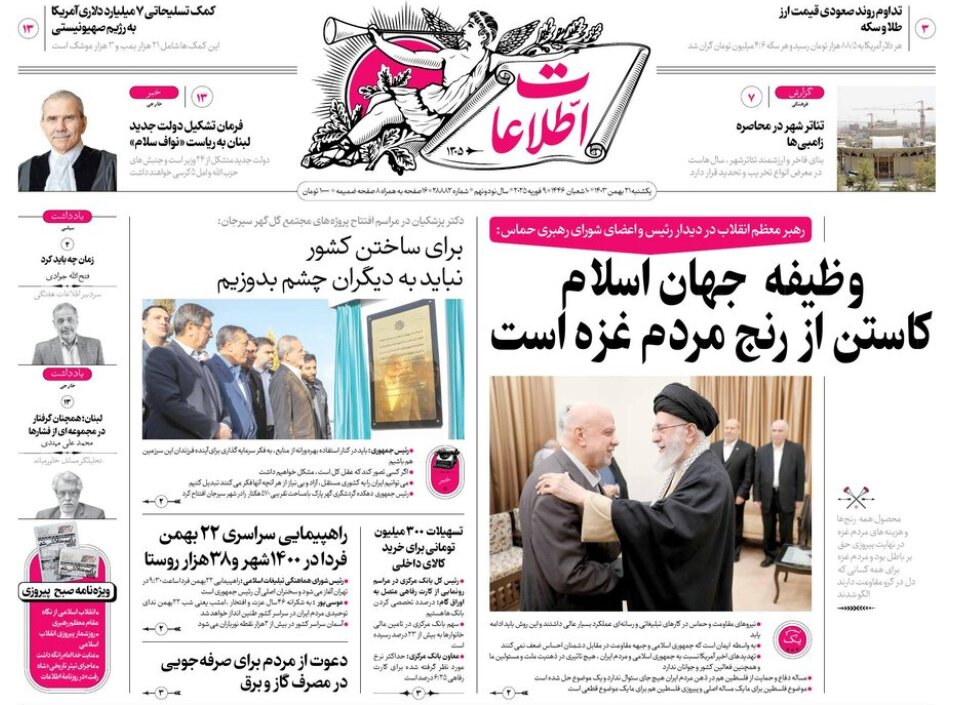Trump must provide a reliable guarantee

TEHRAN - In a commentary, Ettelaat dealt with Donald Trump's interest in expressing interest to negotiate with Iran.
It wrote: The Iranians have said that Iran does not believe in having a nuclear bomb in principle and that any talks should be within the framework of mutual respect. This wise and logical response is what Trump needs. Among the most obvious points that can never be overlooked are Iran's right to have missiles and other necessary defense tools, and the status of the Revolutionary Guard, which, contrary to Trump's claims, is an anti-terrorism force. These are among Iran's red lines, and any country or government that is seeking to negotiate with Iran must agree that these issues are not negotiable in any way. It must also know that the Islamic Republic of Iran has enough power to negotiate honorably with any country. Trump's mistake is that he wants to negotiate with the language of force, something that contradicts the nature of negotiation. If the U.S. president wants a real negotiation, he must first abandon the language of bullying and secondly provide a reliable guarantee.
Siasat-e-Rooz: Coherent approach needed to solve economic problems
Siasat-e-Rooz dedicated its editorial to the unity needed to disappoint the West and wrote: Unfortunately, economic challenges in Iran have caused a misconception in the West that Iran has been weakened and Trump has been emboldened to impose new sanctions against Iran.
The behavior of the West shows that negotiations will not be rational, intelligent, or honorable at the current time. Rather, negotiations will pave the way for an increase in the other side's excessive demands and blackmail. Along with the country's military and defense forces, a coherent approach of the people and the statesmen to solve economic problems can upset the equations of the West. The main point is that the West is under the illusion that the popular support for the system is decreasing, which is why it applies the policy of pressure and sanctions. The active presence of the people in the celebrations marking the victory of the 1979 revolution has upset many equations and can even pave the way for a reduction in sanctions and “maximum pressure” campaign from the West.
Shargh: Double pressure?!
Shargh discussed the impact of the political and diplomatic atmosphere resulting from Trump’s return to the White House and the deadlock in Iran’s negotiations with the West in an interview with Yousef Molaei, an international law professor. He said: The issue of Iran’s nuclear activities has a political connotation, and Trump’s return to cooperation with London, Paris, and Berlin will serve to intensify pressure on Tehran. Trump signed an official presidential memorandum against Iran to revive the maximum pressure campaign. Therefore, news reports indicate that the U.S. mission to the United Nations will also work with America's main allies, the three European countries that are members of the JCPOA, to complete the process of immediately returning international sanctions and limitations on the Islamic Republic. It is likely that at the quarterly meeting of the IAEA Board of Governors, Washington will seek to provoke Europe to activate the trigger mechanism. We are witnessing Israeli moves against Iran's national security, so there is a possibility of issuing a resolution against Tehran. Though the IAEA is a technical and legal body it can be influenced by political attitudes and the influence of powers.
Iran: Lessons learned by Riyadh
In an analysis, the Iran newspaper discussed the relations between Iran and Saudi Arabia. The paper said: The undeniable role of Iran in the region’s political arrangements coupled with transformations in the long-term policy of the leaders of Saudi Arabia and some other Arab countries were among the reasons that have made regional interactions important. In recent years, Saudi Arabia has inevitably learned lessons from the consequences of Middle East tensions and has found out that military attacks to resolve regional crises are ineffective. Achieving security and stability in the region largely entails avoiding confrontation, especially with influential actors such as Iran. Riyadh realized that to be in an ideal economic position and become a global hub for trade and investment, it must link its interests with Tehran and consider repairing relations and establishing a strategic partnership with Iran. What better opportunity to achieve this goal than strengthening ties with the new Iranian government, which has declared its readiness to be friends with all countries in the region?
